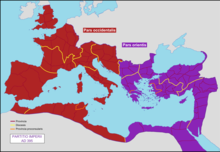Battle of the Frigidus
The posthumous accusation of paganism was first levelled by Tyrannius Rufinus to enhance the reputation of Theodosius I, who was a vigorous promoter of Nicene Christianity and the state church of the Roman Empire.Church histories attributed Theodosius's victory at the Frigidus to divine intervention, and Rufinus equated its importance with the Battle of the Milvian Bridge won by Constantine the Great over Maxentius in 312.Theodosius himself led the army; among his commanders were his own generals Stilicho and Timasius, the Visigoth chieftain Alaric, and a Caucasian Iberian named Bacurios Hiberios.Their advance through Pannonia until the Julian Alps was unopposed, and Theodosius and his officers must have had suspicions about what lay ahead when they discovered that the eastern ends of the mountain passes were undefended.Arbogast had, based on his experiences fighting against the usurper Magnus Maximus in Gaul, decided that the best strategy was to keep his forces united to defend Italy itself, and to that end he went so far as to leave the Alpine passes unguarded.Thanks to Arbogast's strategy of maintaining a single, relatively cohesive force, the Theodosian army passed unhindered through the Alps and descended towards the valley of the Frigidus River to the east of the Roman port of Aquileia.The Eastern army's headlong attack resulted in heavy casualties but little gain: 10,000 of the Gothic auxiliaries are reported to have been slain, and the Georgian general Bacurius was among the dead.Claudian seems to have been making a classicizing allusion to Silius Italicus, whose account of the Battle of Cannae mentioned a similar wind blowing spears and weapons back.[9] Historian Michele Renee Salzman explains that "two newly relevant texts — John Chrysoston's Homily 6, adversus Catharos (PG 63: 491-92) and the Consultationes Zacchei et Apollonii, re-dated to the 390s, reinforce the view that religion was not the key ideological element in the events at the time".[10] According to Maijastina Kahlos, Finnish historian and Docent of Latin language and Roman literature at the University of Helsinki, the notion of pagan aristocrats united in a "heroic and cultured resistance" who rose up against the ruthless advance of Christianity in a final battle near Frigidus in 394, is a romantic myth.This downturn in the capabilities of the Roman soldiers meant an increasing reliance by the Empire on barbarian mercenaries employed as foederati, who often proved to be unreliable, or even treacherous.


Johann Weikhard von ValvasorVipavaSloveniaEastern Roman EmpireVisigothsWestern Roman EmpireTheodosius ITimasiusStilichoAlaricBacuriusGainasEugeniusArbogastHerculiani senioresCivil wars of the TetrarchySegusioBresciaVeronaMilvian BridgeTzirallumCibalaeMardiaAdrianopleHellespontByzantiumChrysopolis350–353Mursa MajorMons SeleucusJewish revoltThyatiraPoetovioGildonic WarDiocese of PannoniaRoman emperorTheodosius the GreataugustusRoman ItalyRoman EmpireClaustra Alpium IuliarumJulian AlpsVipava ValleyIsonzomagister militummagister utriusque militiaeValentinian IIBacurius the IberianMagnus Maximusecclesiastical historyRoman paganismTyrannius RufinusNicene Christianitystate church of the Roman EmpireBattle of the Milvian BridgeConstantine the GreatMaxentiusAquileiaViennepraetorian prefectRufinusRichomeresNicomachus FlavianusSymmachusHonoriusValensBattle of AdrianopleFlavius StilicholegionsEutropiusLycopolisClaudianSozomenVictoryVisigothCaucasian IberianBacurios HiberiosFranksAlemanniGallo-RomansVrhpoljeSanaborChristianization of the Roman Empire as diffusion of innovationAlan CameronMagnentiusAmbrose of MilanSilius ItalicusMichele Renee SalzmanMaijastina KahlosArcadiusfoederatiJohn Julius Norwich
